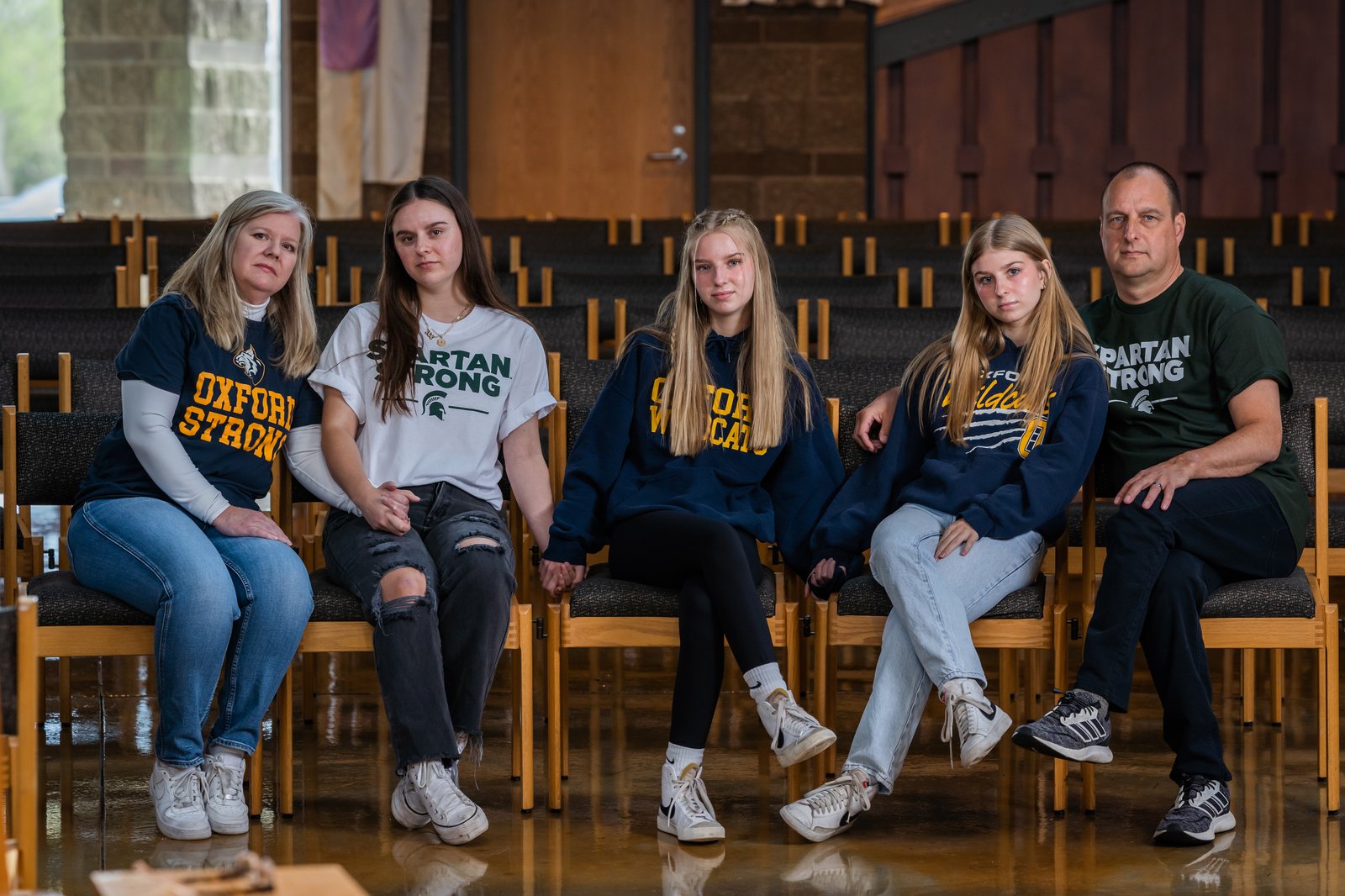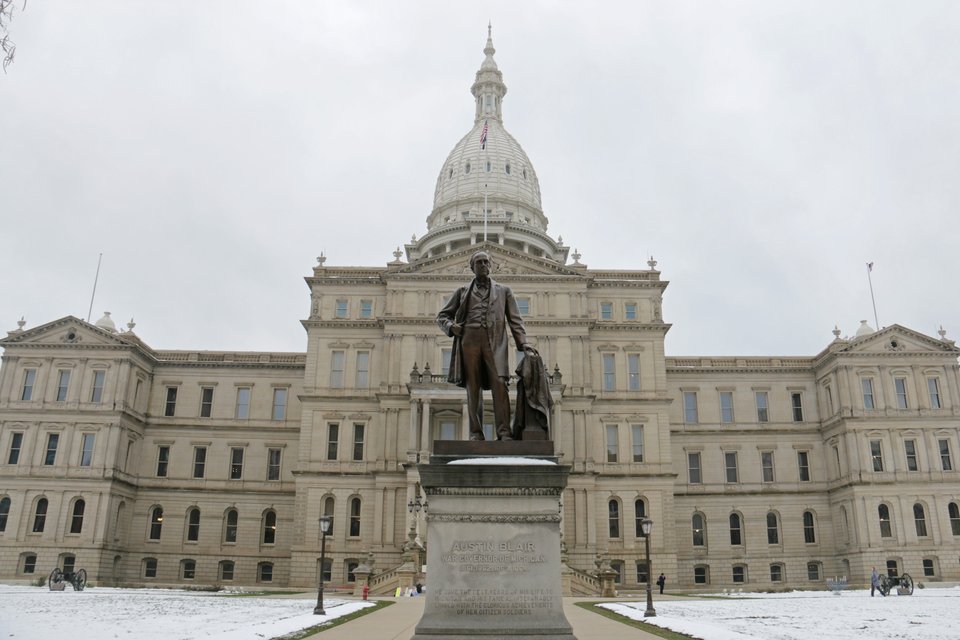Lake Orion parishioners affected by two school shootings say Church can be part of solution to problem plaguing society
Editor's note: The following article was first published in FOCUS, the Michigan Catholic Conference's quarterly publication examining issues of faith and public policy. Read more at micatholic.org/gun-violence.
OXFORD — Like anyone, Pat Damer never thought it could happen to him or his family.
But it did. Twice.
His daughter was at Oxford High School the day of the 2021 shooting that claimed the lives of four students and injured seven people. Her class barricaded themselves and armed themselves with scissors and textbooks. She survived.
A year later, another of Pat's daughters was on campus at Michigan State University the night when a gunman walked into two buildings and killed three students and injured five others. She also survived.
Those experiences changed Pat.
"I think it was the direct impact to family and friends — and specifically my daughters — that drew me more into the issue" of gun violence, Damer said, who said he had a "healthy respect" for guns growing up. He now serves on his parish's peace and justice committee working to educate Catholics on gun violence.
"The Church can be part of the solution to gun violence, by being the Church — the mission is to teach and preach the Gospel and live it out," Damer said. "I think the Church … can and needs to play a vital role in this discussion."
More from the Michigan Catholic Conference: Responding to gun safety reform objections
In recent months, the Michigan Legislature has approved bills to implement gun safety reforms and curb gun violence. The Michigan Catholic Conference testified in support of the bills, in continuity with positions taken by the U.S. Conference of Catholic Bishops and other state Catholic conferences in supporting gun safety reforms to protect human life and address violence in society.
While there are many factors that influence gun violence, gun regulation is still part of the conversation. Acknowledging that gun policies alone will not solve every problem, this edition of FOCUS will examine gun safety policies and why they are part of the Catholic response to gun violence.
The stats on gun violence
Statistics show an increasing number of deaths in this country and state are involving guns.
- In 2021, the United States hit a record of 48,832 gun deaths
- Firearm deaths have been climbing nationwide since 2014.
- The gun death rate in Michigan increased by 25% over the past decade.
- In 2021, four Michiganders died from gun violence each day, on average.
- Since 2011 in Michigan, the number of deaths from firearms "far exceeds" the number of deaths from car crashes.
Many people associate gun violence with mass shootings, but the plague of gun violence runs deeper than those high-profile events.
- Firearms were the leading cause of deaths for children and teens up to age 19 in Michigan in 2021.
- The 117 Michigan children killed by guns was four times more than by drowning or poisoning.
- Gun suicides accounted for 53.9% of the country's gun deaths in 2021, another record high.
- More than half of Michigan's 2021 gun deaths were related to suicide.
The shooter or the gun?
Not everyone is convinced more gun regulation is an appropriate response to this violence. When people say, "guns don't kill people, people kill people," it is a recognition there are numerous factors for why a person decides to commit violence.
Catholics do not have to settle into an either/or mindset. Rather, the faithful can and should embrace a both/and approach. With gun violence, it is no different.

"It's about guns, but it's also about other societal problems that we have that we are not dealing with," said Fr. John McKenzie, a priest in solidum serving Christ the King Parish in Detroit.
Taking guns off the street is important, but Fr. McKenzie said until deeper issues are addressed, "we're going to always circle back" like a "dog chasing its tail."
While the conference of American bishops has advocated for gun safety reforms, the body has also acknowledged the prevalence of violence as the root issue.
In a 2022 letter to Congress, the U.S. bishops called for addressing violence through "dialogue followed by concrete action to bring about a broader social renewal that addresses all aspects of the crisis." They listed "mental health, the state of families, the valuation of life, the influence of entertainment and gaming industries, bullying" as issues of concern.
Yet the bishops also mentioned the "availability of firearms," adding that, "among the many steps toward addressing this endemic of violence is the passage of reasonable gun control measures."
This approach was echoed by the Michigan Catholic Conference in supporting the Michigan gun safety legislation, noting "the real issue at hand" is "violence in our society" and called for policy actions that "embrace and foster a culture of life."
Why 'ready availability' of guns is a problem
The U.S. bishops have pointed out that guns — particularly their availability to people in conflict — are what can turn something like an argument into a deadly tragedy.
“Most homicides are not the result of criminal design but rather they are the outcome of quarrels and arguments among spouses, friends and acquaintances," the U.S. bishops conference said in a 1975 document, Handgun Violence: A Threat to Life. "In these situations, it is the ready availability of handguns that often leads to tragic and deadly results."
Deacon Tom Bousamra, who has been engaged in jail ministry in the Diocese of Gaylord for 36 years, said most people he ministers to suffer from mental illness or struggle with addiction. Their ability to access guns just makes situations worse.
"Take guns out of that equation and there might be less of a criminal reality," he said.
The U.S. bishops' advocacy has focused on the "easy availability of deadly weapons," considering that "weapons that are increasingly capable of inflicting great suffering in a short period of time are simply too accessible."
More from the Michigan Catholic Conference: Analysis of Michigan gun safety legislation
The U.S. has more guns than people, and research has shown that developed countries and American states with more guns experience more homicides. The national bishops’ conference has called for "measures that control the sale and use of firearms and make them safer," particularly "efforts that prevent their unsupervised use by children or anyone other than the owner."
It should be noted that Catholic bishops are not calling for guns to be taken from law-abiding citizens, nor are they discouraging hunting. In fact, the Catechism's teaching on self-defense acknowledges that "someone who defends his life is not guilty of murder even if he is forced to deal his aggressor a lethal blow." The Catechism also states, "legitimate defense can be not only a right but a grave duty for one who is responsible for the lives of others."
However, Church teaching does discuss small arms and light weapons from the perspective of states' responsibility to regulate them, given that "the sale and trafficking of such weapons constitute a serious threat to peace."
The Church holds that "it is indispensable and urgent that Governments adopt appropriate measures to control the production, stockpiling, sale and trafficking of" small arms.
How is gun violence related to Catholic social principles?
Addressing gun violence is directly connected to protecting human life, the bedrock Catholic social principle.
"You see how many people are dying from this … it really comes down to the human life and dignity of the person," said Karen Swietlik, parish staff liaison to the peace and justice committee at Christ the Redeemer Parish in Lake Orion, the group Oxford parent Damer serves with that is educating parishioners about gun violence.

Deacon Bousamra said he believes gun safety regulation is a public safety issue, and the U.S. bishops have said, "the unlimited freedom to possess and use handguns must give way to the rights of all people to safety and protection against those who misuse these weapons."
In his argument for protecting people suffering from mental health issues from hurting themselves or others, Deacon Bousamra also sees addressing gun violence as connected to the Catholic principle of providing a preferential option to the poor and marginalized.
The number of children killed or wounded by guns is also grounds for Catholic action based on protecting the vulnerable, said Nancy Clancy, a member of the Christ the Redeemer peace and justice committee.
"No child should die from a gunshot wound," she said, adding that gun violence is not only killing children but also "causing such a fear in our children."
Widely publicized mass shootings, routine school shooter drills for children, or the persistent threat of gun violence in troubled neighborhoods all increase fear. That fear contributes to a lack of peace, which the Catechism teaches is required for achieving the common good.
Catholics in action
Christ the Redeemer Parish's proximity to the Oxford tragedy meant many parishioners were personally affected by the shooting.
"You experience a certain amount of tragedy when you read about it in the paper, but when it hits closer to home, your horror level rises," Clancy said. "This should not be happening to our friends and to our parishioners … it shouldn't be happening to anybody."
The Word from Lansing: Dignity, sanctity of life guides Church's response to gun violence
In response to gun violence, the parish committee initiated a letter-writing campaign to lawmakers to urge support of gun safety reforms moving through the Michigan Legislature. The committee encouraged individual parishioners to sign, and 350 letters were ultimately sent to lawmakers.
In Detroit, St. Charles Lwanga Parish has taken a different approach to tackling gun violence by offering parishioners the opportunity to safely surrender unwanted guns through parish-funded gun buyback events.
"It relieves an innocent person from being in a situation of violence," said Fr. Theodore Parker of St. Charles Lwanga, adding that gun buybacks take excess guns out of circulation and prevent them falling into the wrong hands.
Catholic voices: What's next?
Damer believes the entire Church should pay more attention to gun violence. Until recently, he had not heard gun violence addressed in a homily.
"The Church is its people, right? I need to do more, and the leadership of the Church needs to do more. It needs to be a cohesive effort," Damer said. "We have an obligation to help be a part of the solution."
The polarization present in society means that sometimes the very mention of guns can shut down the conversation, Swietlik said. People in the pews have varying opinions, which could explain the hesitancy for why it hasn’t been addressed more often by Church leaders, she said.
"I think that so many people see it as a political issue, a Second Amendment issue," Clancy said, but added that people should see it as a "moral obligation to care about what's happening to our neighbors."
While the Michigan and U.S. bishops nationally have identified gun safety reforms as good public policy, at the same time, "not even the most effective gun laws, by themselves, will suffice to address the roots of these violent attacks in our country."
That's where the Church comes in. Fr. McKenzie said that as the Body of Christ on earth, the Church cannot "just sit back and let our society just go to waste." When it comes to understanding mass shootings, Fr. McKenzie said these shooters have sometimes documented their despair or lack of hope ahead of time.
"I think we need to bring new hope and light to people … that's a first step, bringing hope and light that is Jesus Christ Himself to communities and people in the world today," Fr. McKenzie said.
Jacob Kanclerz is communications associate for the Michigan Catholic Conference, the official public policy voice of the Catholic Church in this state.
Copy Permalink
Social justice












